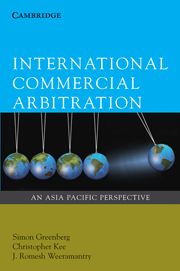Book contents
- Frontmatter
- Contents
- Foreword
- Preface
- Table of Cases
- Table of Statutes
- 1 Introduction to international arbitration and its place in the Asia-Pacific
- 2 Law governing the arbitration and role of the seat
- 3 Applicable substantive law
- 4 Arbitration agreement
- 5 Arbitral jurisdiction
- 6 The arbitral tribunal
- 7 Procedure and evidence
- 8 The award
- 9 The award
- 10 Investment treaty arbitration
- Appendix 1 Asia-Pacific arbitral institutions at a glance
- Appendix 2 Selected arbitral institutions
- Appendix 3 List of UNCITRAL Model Law countries
- Appendix 4 List of parties to the New York Convention 1958
- Appendix 5 Selected list of Asia-Pacific arbitration legislation and instruments
- Glossary
- Index
Preface
Published online by Cambridge University Press: 05 June 2012
- Frontmatter
- Contents
- Foreword
- Preface
- Table of Cases
- Table of Statutes
- 1 Introduction to international arbitration and its place in the Asia-Pacific
- 2 Law governing the arbitration and role of the seat
- 3 Applicable substantive law
- 4 Arbitration agreement
- 5 Arbitral jurisdiction
- 6 The arbitral tribunal
- 7 Procedure and evidence
- 8 The award
- 9 The award
- 10 Investment treaty arbitration
- Appendix 1 Asia-Pacific arbitral institutions at a glance
- Appendix 2 Selected arbitral institutions
- Appendix 3 List of UNCITRAL Model Law countries
- Appendix 4 List of parties to the New York Convention 1958
- Appendix 5 Selected list of Asia-Pacific arbitration legislation and instruments
- Glossary
- Index
Summary
International arbitration is firmly established worldwide as a distinct discipline. A major component of its exponential growth in the last 15–20 years emanates from the Asia-Pacific region. In Chapter 1 we describe an Asia-Pacific arbitration craze that includes sharp increases in the case loads of its major arbitral institutions, a raft of important legislative changes, and a flurry of other regionally focussed international arbitration activity.
In its traditional centres (mainly Europe and more recently North America), international arbitration has grown into an important industry for the legal profession and has consequently become an essential subject for university legal studies. Numerous textbooks have emerged in response, but until now none focuses on the Asia-Pacific. There are several practitioners' guides on specific Asia-Pacific jurisdictions, but no book addresses the region in a subject-by-subject textbook style.
When we embarked on this project, we believed there was a need for an Asia-Pacific focused international arbitration textbook. The 2008 financial crisis has reinforced that belief. Adrian Winstanley, writing in The Asia Pacific Arbitration Review 2009 (a Global Arbitration Review publication), captured the essence of this increased need when he observed:
We have, then, had the most piercing of wake-up calls, which must surely lead to a new global economic order, at the heart of which will, once again, be the great tiger economies of the Asia-Pacific, which have had not only to rethink economic strategy regarding their export markets and foreign investments, but also to manage the expectations of their huge populations for improvements in their quality of life, while minimising the environmental impact of growing consumer demands. […]
- Type
- Chapter
- Information
- International Commercial ArbitrationAn Asia-Pacific Perspective, pp. xvii - xviiiPublisher: Cambridge University PressPrint publication year: 2010



